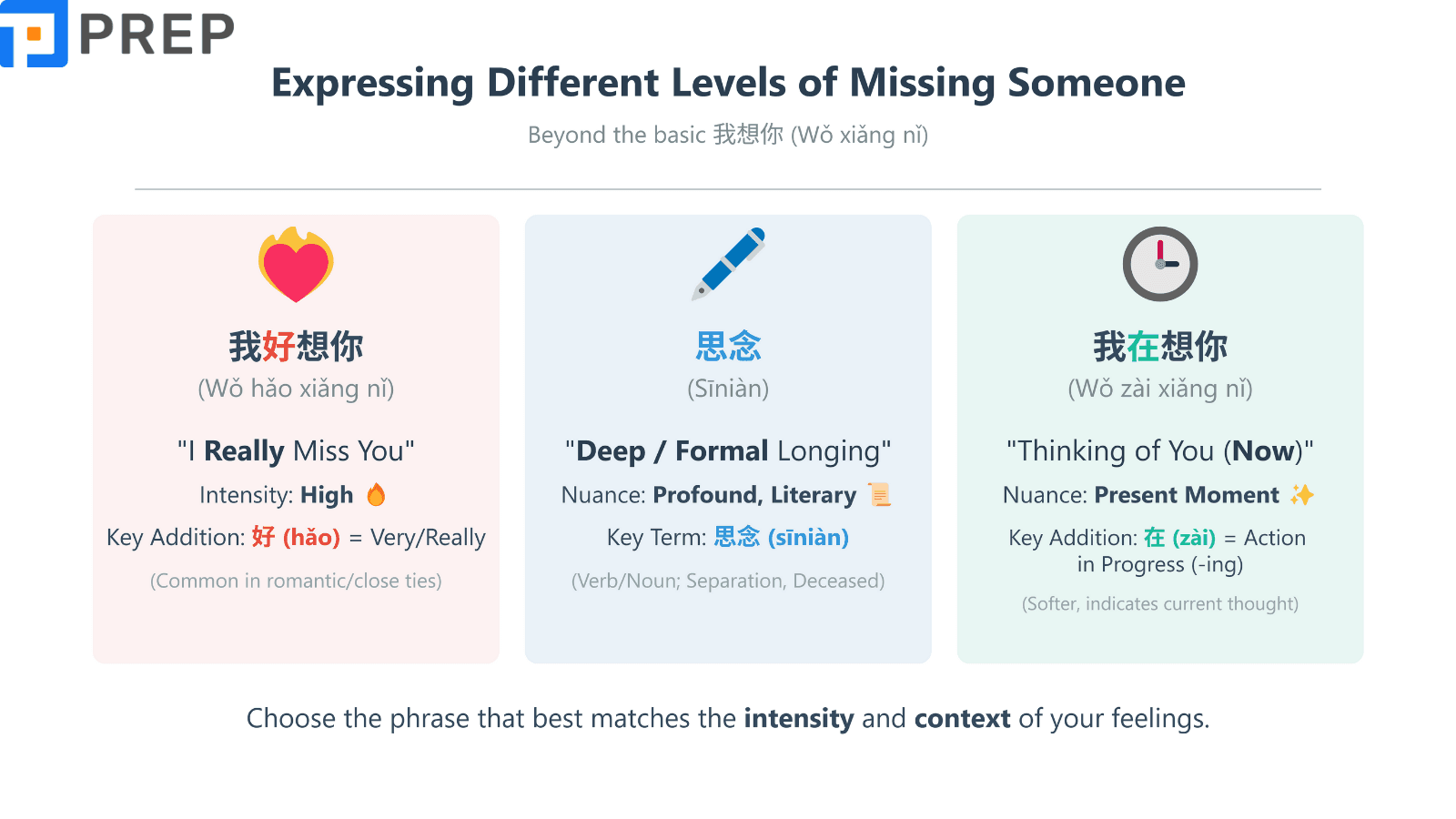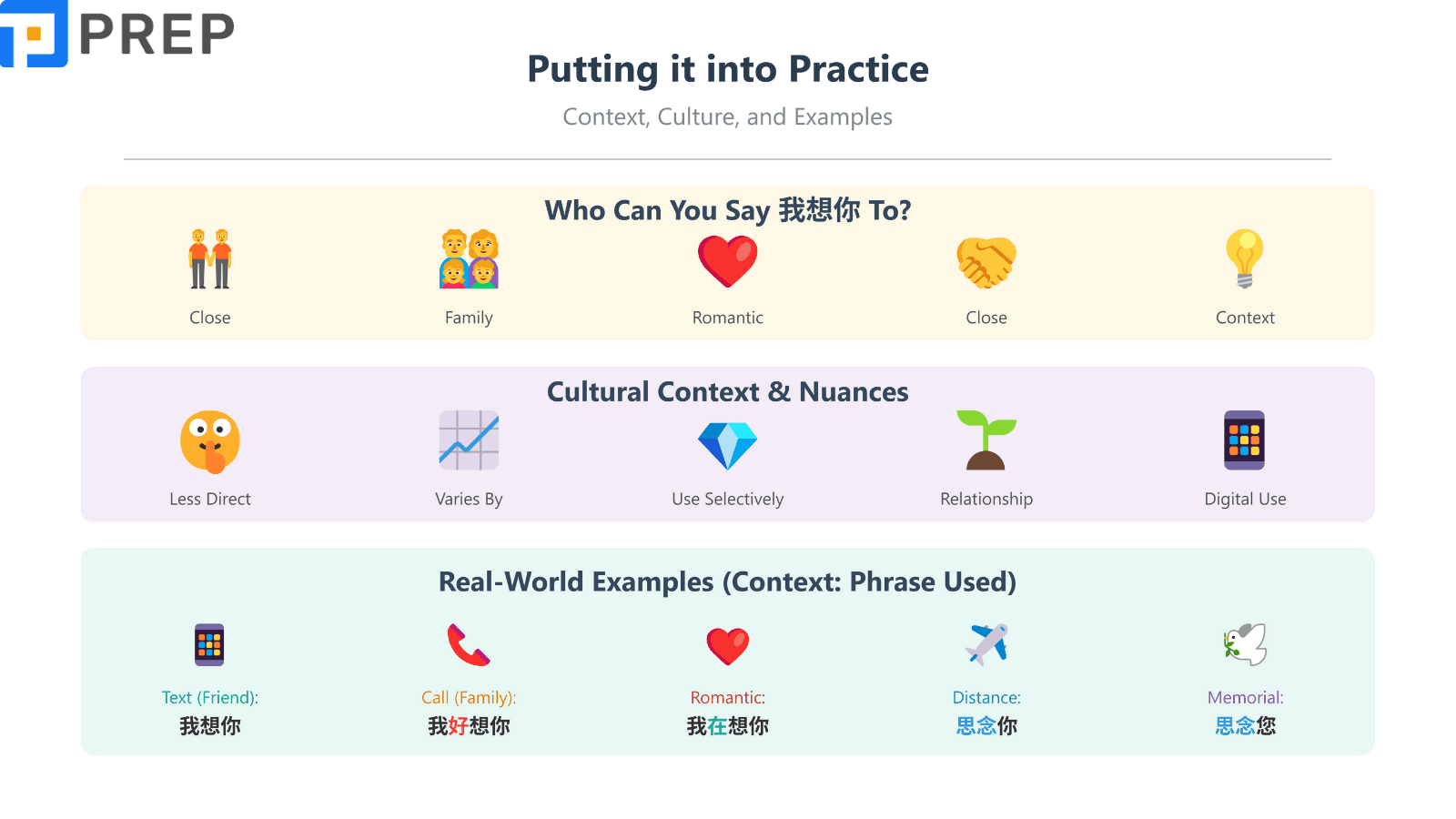The Ultimate Guide to Saying I Miss You in Chinese: From 我想你 to Deeper Expressions
Expressing "I miss you in Chinese" allows meaningful connection across language barriers. The Chinese language offers several ways to convey this sentiment, from casual to deeply emotional phrases. This article aims to introduce you to the most common expressions for missing someone in Mandarin Chinese, including 我想你 (Wǒ xiǎng nǐ), along with pronunciation guidance and cultural context to help you communicate your feelings authentically.
- I. Main Content: Mastering I Miss You in Mandarin Chinese
- II. Supplemental Content: Refining Your Understanding and Addressing Nuances
- 1. Is 我想你 strictly romantic?
- 2. What's the core difference in feeling between 我想你 and 我思念你?
- 3. Can you categorize the main ways to express missing someone based on intensity/formality?
- 4. How does the directness of 我想你 compare to "I miss you" in English within typical cultural contexts?
- 5. Is it appropriate to use 我想你 when remembering someone who has passed away?
- III. Final Thoughts: Connecting Authentically Through Language

I. Main Content: Mastering I Miss You in Mandarin Chinese
Expressing emotions across language barriers requires precision and cultural understanding. This guide will equip you with the essential phrases and cultural context to say "I miss you in Chinese" authentically and effectively. Whether you're learning for personal connections or professional growth, knowing how to express this sentiment in the Chinese language creates meaningful bonds.
1. Your Core Answer: 我想你 (Wǒ xiǎng nǐ) - The Essential Phrase

1.1. Introducing 我想你 (Wǒ xiǎng nǐ): The Go-To Phrase for Missing Someone
The standard and most widely used phrase for "I miss you in Chinese" is 我想你 (Wǒ xiǎng nǐ). This fundamental expression works across most contexts and relationships when you want to express that feeling of missing someone in Mandarin Chinese. Learning how to say I miss you in Chinese language begins with mastering this essential phrase.
1.2. Deconstructing the Phrase: Character Meanings (我, 想, 你)
Understanding each character helps cement your knowledge of how to express "I miss you in Chinese":
我 (wǒ) means "I" or "me" - the first-person pronoun used to refer to oneself.
想 (xiǎng) is the key character here, conveying "miss," "think of," or "want" depending on context.
你 (nǐ) simply means "you" - the person you're addressing.
1.3. Pronunciation Perfected: Getting the Sounds and Tones Right
Accurate pronunciation when saying I miss you in Mandarin depends heavily on mastering the tones. All three characters in 我想你 (Wǒ xiǎng nǐ) carry the third tone, but an important pronunciation rule applies.
In Mandarin, when two third tones appear consecutively, the first changes to a second tone. This phenomenon, called tone sandhi, transforms 我想你 from wǒ xiǎng nǐ (3-3-3) to wó xiǎng nǐ (2-3-3) in natural speech.
For approximate English pronunciation when learning how to say I miss you in Chinese:
-
我 (wǒ): Sounds similar to "waw" with a dipping tone
-
想 (xiǎng): Pronounced roughly like "shyang" with a dipping tone
-
你 (nǐ): Similar to "nee" with a dipping tone
1.4. The Key Character 想 (xiǎng): Unpacking its Meanings (Miss, Think, or Want?)
The character 想 (xiǎng) carries multiple meanings, making it one of Mandarin's most versatile and context-dependent verbs. When followed by a person (我想你), it primarily means "miss." This nuance is crucial for correctly expressing "I miss you in Chinese language."
Compare these examples:
-
我想你 (Wǒ xiǎng nǐ) - "I miss you"
-
我想吃饭 (Wǒ xiǎng chīfàn) - "I want to eat"
-
我想明天会下雨 (Wǒ xiǎng míngtiān huì xiàyǔ) - "I think it will rain tomorrow"
This subtlety explains why 我想你 is understood specifically as "I miss you" rather than "I think of you" or "I want you" in standard contexts.
2. Expressing Different Levels of Missing Someone
Just as English offers variations like "I really miss you" or "I long for you," Chinese provides several ways to express different intensities of missing someone when learning how to say I miss you in Chinese.

2.1. Adding Emphasis: "I Really Miss You" with 我好想你 (Wǒ hǎo xiǎng nǐ)
When you want to express a stronger feeling of missing someone, add 好 (hǎo) between 我 and 想. This creates 我好想你 (Wǒ hǎo xiǎng nǐ), meaning "I really miss you" or "I miss you so much."
The character 好 (hǎo) typically means "good," but in this context functions as an intensifier, similar to "very" or "really" in English. This phrase conveys greater emotional intensity and is common in romantic contexts or when expressing deep feelings toward family and close friends.
2.2. Deeper, Formal Longing: Understanding and Using 思念 (Sīniàn)
For profound, enduring longing, the Chinese offer the more literary term 思念 (sīniàn). This two-character word carries deeper emotional weight than 想 and appears frequently in poetry, literature, and formal expressions of I miss you in Chinese.
You can use it as either a verb or a noun:
-
我思念你 (Wǒ sīniàn nǐ) - "I deeply miss you/long for you" (verb)
-
我对你的思念 (Wǒ duì nǐ de sīniàn) - "My longing for you" (noun)
This expression is particularly appropriate for situations involving prolonged separation, homesickness, or missing deceased loved ones.
2.3. A Gentler Expression: "I'm Thinking of You" - 我在想你 (Wǒ zài xiǎng nǐ)
For a more present-moment, ongoing sense of missing someone in the Chinese language, add 在 (zài) before 想. This creates 我在想你 (Wǒ zài xiǎng nǐ), which literally translates to "I am thinking of you" or "I am missing you (right now)."
The character 在 (zài) indicates an action in progress, similar to the "-ing" form in English. This phrase conveys that you're actively thinking about or missing the person at the moment you're speaking, adding a temporal dimension to your expression.
3. Putting it into Practice: Context, Culture, and Examples
Knowing when and how to use these phrases is as important as knowing how to say I miss you in Chinese.

3.1. Who Can You Say 我想你 To? (Friends, Family, Romantic Partners)
While 我想你 translates directly to "I miss you," its usage extends beyond romantic contexts. You can appropriately use it with:
-
Close friends you haven't seen in a while
-
Family members living far away
-
Romantic partners (though intensity may vary based on relationship stage)
-
Long-distance colleagues with whom you've developed a meaningful connection
The phrase itself doesn't carry inherently romantic connotations in Chinese, though context and tone naturally influence how it's received.
3.2. Cultural Context: Directness and Frequency in Chinese Communication
Traditional Chinese communication tends to be less direct with emotional expressions than some Western cultures. While younger generations and those in urban areas increasingly express feelings openly, there remains a cultural tendency toward emotional restraint in certain contexts when saying I miss you in Chinese language.
Consider these cultural nuances:
-
Express 我想你 after establishing a solid relationship foundation
-
The phrase carries more weight when used selectively rather than frequently
-
Non-verbal cues often accompany verbal expressions of missing someone
-
Digital communication (texting, social media) has normalized more frequent expressions of missing others
These tendencies vary significantly across generations, regions, and individual relationship dynamics, so observe and adapt to specific interpersonal contexts.
3.3. Real-World Examples: Using "I Miss You" Phrases Naturally
-
Text message to a friend: 好久不见,我想你! (Hǎojiǔ bú jiàn, wǒ xiǎng nǐ!) - "Long time no see, I miss you!"
-
Phone call with family: 妈妈,我好想你,什么时候回家? (Māma, wǒ hǎo xiǎng nǐ, shénme shíhòu huí jiā?) - "Mom, I really miss you. When are you coming home?"
-
Romantic context: 每天晚上睡觉前,我都在想你。(Měitiān wǎnshàng shuìjiào qián, wǒ dōu zài xiǎng nǐ.) - "Every night before sleep, I'm thinking of you."
-
Long-distance relationship: 虽然我们相隔千里,但我时刻思念你。(Suīrán wǒmen xiānggé qiānlǐ, dàn wǒ shíkè sīniàn nǐ.) - "Though thousands of miles separate us, I long for you constantly."
-
Missing a deceased relative: 爷爷,我深深地思念您。(Yéye, wǒ shēnshēn de sīniàn nín.) - "Grandfather, I deeply miss you."
4. Expanding Your Vocabulary: Related Terms for Affection and Longing
Understanding related expressions of affection and longing enriches your ability to communicate emotional nuances when expressing I miss you in Chinese.
|
No. |
Chinese |
Pinyin |
English Meaning |
|
1 |
爱 |
ài |
love |
|
2 |
想念 |
xiǎngniàn |
to miss, to think of with longing |
|
3 |
怀念 |
huáiniàn |
to cherish the memory of, to recall with fondness |
|
4 |
渴望 |
kěwàng |
to long for, to yearn for |
|
5 |
牵挂 |
qiānguà |
to miss, to be concerned about |
|
6 |
亲爱的 |
qīn'ài de |
dear, beloved (term of endearment) |
|
7 |
宝贝 |
bǎobèi |
baby, treasure (affectionate term) |
|
8 |
想你想得睡不着 |
xiǎng nǐ xiǎng de shuì bù zháo |
missing you so much I can't sleep |
5. Reinforcing Learning: Using Media
Engaging with authentic Chinese media provides valuable exposure to how to say I miss you in Mandarin naturally.
Chinese songs often feature expressions of missing someone, making them excellent learning resources. Popular ballads frequently include phrases like 还是想你 (háishì xiǎng nǐ - "still miss you") or 一直想你 (yīzhí xiǎng nǐ - "always miss you").
These musical contexts help you internalize both the pronunciation and emotional weight of the expressions. They also demonstrate how these phrases fit into broader narrative contexts and emotional landscapes.
II. Supplemental Content: Refining Your Understanding and Addressing Nuances
To develop a more comprehensive grasp of how to say I miss you in Chinese, let's address some common questions and explore additional nuances.
Answering Your Questions: FAQs and Deeper Insights
These frequently asked questions clarify common points of confusion and provide deeper cultural insights.
1. Is 我想你 strictly romantic?
No, 我想你 (Wǒ xiǎng nǐ) is not exclusively romantic. Chinese speakers commonly use this phrase with family members, close friends, and other platonic relationships. The context, tone, and relationship between speakers determine how the phrase is interpreted, similar to "I miss you" in English.
2. What's the core difference in feeling between 我想你 and 我思念你?
The primary distinction lies in emotional depth and formality. 我想你 (Wǒ xiǎng nǐ) expresses everyday missing, suitable for regular separations and common interactions. In contrast, 我思念你 (Wǒ sīniàn nǐ) conveys deeper, more profound longing, appropriate for extended separations or more formal expressions of missing someone. 思念 carries literary and poetic connotations that 想 doesn't typically evoke.
3. Can you categorize the main ways to express missing someone based on intensity/formality?
These expressions generally fall into three categories:
Casual/Common: 我想你 (Wǒ xiǎng nǐ), 我在想你 (Wǒ zài xiǎng nǐ) - Suitable for everyday situations and most relationships.
Intense: 我好想你 (Wǒ hǎo xiǎng nǐ), 我非常想你 (Wǒ fēicháng xiǎng nǐ) - Express stronger feelings of missing someone.
Formal/Deep: 我思念你 (Wǒ sīniàn nǐ), 我怀念你 (Wǒ huáiniàn nǐ) - Convey profound longing, often in literary contexts or for significant separations.
4. How does the directness of 我想你 compare to "I miss you" in English within typical cultural contexts?
While 我想你 directly translates to "I miss you," traditional Chinese communication culture generally exhibits more restraint with emotional expressions than typical Western contexts. Historically, explicitly stating "I miss you" might have been less common in Chinese interactions than in some Western countries. However, contemporary Chinese communication, especially among younger generations and in digital contexts, has become increasingly direct with emotional expression, narrowing this cultural gap.
5. Is it appropriate to use 我想你 when remembering someone who has passed away?
While 我想你 would be understood in this context, more respectful and appropriate expressions exist for missing deceased loved ones. 思念 (sīniàn) or 怀念 (huáiniàn) better conveys the depth and reverence appropriate for remembering the departed. For example, 我深深地思念您 (Wǒ shēnshēn de sīniàn nín) - "I deeply miss you" - using the respectful form of "you" (您 nín rather than 你 nǐ) shows proper reverence when speaking of those who have passed.
III. Final Thoughts: Connecting Authentically Through Language
1. Recap: The Power of Expressing "I Miss You" (我想你) Correctly
Mastering how to say I miss you in Chinese opens meaningful pathways to express emotion across cultural and linguistic boundaries. The primary phrase 我想你 (Wǒ xiǎng nǐ) serves as your foundation, while variations like 我好想你 and 我思念你 allow you to convey different emotional intensities and contexts. Understanding not just the translations but the cultural nuances ensures your expressions resonate authentically in the Chinese language.
2. Encouragement: Using Your Knowledge to Build Stronger Connections
Language connects hearts across distances. Whether you're learning how to say I miss you in Mandarin to communicate with loved ones, business associates, or to enrich your cultural understanding, these expressions of missing someone will serve you well. Practice using these phrases in appropriate contexts, and you'll discover they become powerful tools for maintaining and strengthening your connections with Chinese speakers. Remember that genuine emotion transcends perfect pronunciation or grammar—your sincere effort to communicate in someone's native language often means more than flawless execution.

Hi I'm Chloe, and I am currently serving as an Product Content Administrator at Prep Education. With over five years of experience in independent online IELTS study and exam preparation, I am confident in my ability to support learners in achieving their highest possible scores.
Comment
Premium content
View allPersonalized roadmap
Most read












